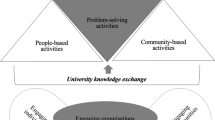Abstract
The Mondragón cooperative complex in the Basque country of Spain is recognized as the world’s most impressive case of industrial cooperative development. The complex links together industrial, service, and agricultural cooperatives with a bank and a series of educational cooperatives. The continued expansion of the complex defies the conventional wisdom that worker cooperatives can only survive briefly in special niches not of interest to multi-national businesses.
Mondragón’s dynamic growth and development cannot be due to some special features of the Basque culture. Success is due in part to the extraordinary vision and leadership of the founder, father José María Arizmendiarrieta, to the social inventions he created, and to theorganizational culture that he and his followers built to guide the complex.
Similar content being viewed by others
References
BLASI, JOSEPH 1989Employee ownership: Revolution or ripoff? New York: Ballinger.
GREENWOOD, DAVYDD J. and JOSÉ LUIS GONZALES SANTOS 1993Industrial Democracy as process: Participatory action research in the Fagor cooperative group of Mondragón, Stockholm: Van Gorcum, Assen/Mastricht.
MARTINEZ, A. 1991El. grup cooperatiu de Valencia. Valencia: Caixa Popular.
OAKESHOTT, ROBERT 1973 Mondragón: Spain’s oasis of democracy. London:London Observer January 21.
WHYTE, WILLIAM F. and KATHLEEN KING WHYTE 1989,
1991.Making Mondragón: The growth and dynamics of the worker cooperative complex. Ithaca: ILR Press.
Additional information
William Foote Whyte is professor emeritus (1979) in Cornell University’s New York State School of Industrial and Labor Relations. He continues to be active in the extension division of the School as research director of Programs for Employment and Workplace Systems. His best known book isStreet Corner Society. With Kathleen King Whyte, he publishedMaking Mondragón: The Growth and Dynamics of the Mondragón Cooperative Complex. His latest book is an autobiography,Participant Observer.
Rights and permissions
About this article
Cite this article
Whyte, W.F. Learning from the Mondragón cooperative experience. St Comp Int Dev 30, 58–67 (1995). https://doi.org/10.1007/BF02802954
Issue Date:
DOI: https://doi.org/10.1007/BF02802954




